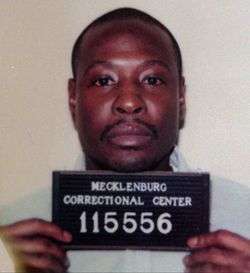Coleman Gray was executed by the State of Virginia for the murder of Richard McClelland
According to court documents Coleman Gray and an accomplice would kidnap grocery store manager Richard McClelland who would be robbed and murdered
Coleman Gray would be arrested, convicted and sentenced to death
Coleman Gray would be executed by lethal injection on February 26 1997
Coleman Gray Photos

Coleman Gray Case
Coleman Wayne Gray, convicted of killing a convenience store manager, was executed by injection tonight after his final appeals were rejected — one of them by a federal judge who said that although he believed Gray had been unfairly sentenced, he was powerless to grant a stay.
Gray, 39, was pronounced dead at 9:06 p.m. at the Greensville Correctional Center here. A corrections official said Gray made no final statement.
A string of appeals was denied today by the U.S. Supreme Court and the 4th U.S. Circuit Court of Appeals. Gov. George Allen (R) denied clemency.
Four hours before the scheduled execution, U.S. District Judge James R. Spencer, who had ruled in Gray’s favor before, denied another appeal. Spencer said that although he believed the sentencing was unfair, court precedents and passage by Congress of the Antiterrorism and Effective Death Penalty Act of 1996, which limited death penalty appeals, tied his hands
“One cannot morally support the death penalty without some assurance, by evidence or faith, that the ultimate penalty is imposed fairly,” the judge wrote.
Gray, a laborer, was convicted of the May 2, 1985, kidnapping, robbery and slaying of Richard McClelland, a Portsmouth convenience store manager who had fired Gray’s wife.
A Suffolk County jury found Gray guilty after an accomplice testified that the pair followed McClelland after work one night, abducted him and robbed his store. The two men took McClelland to a field, where the prosecution said Gray shot him six times in the head with a .32-caliber revolver. The car driven by McClelland, a father of four, was found burned seven miles away.
Gray never denied he took part in the robbery. But he maintained that co-defendant Melvin Tucker was the trigger man
Gray’s defenders said he was wrongly sentenced, and death penalty opponents argued that his appeal showed that federal courts have tilted too far toward expediting capital sentences, despite objections over fairness.
The night before Gray’s sentencing, Suffolk Commonwealth’s Attorney C. Phillips Ferguson told Gray’s attorney he would introduce crime scene photographs and autopsy reports to link Gray to the 1984 slaying of Lisa Sorrell, a 21-year-old mother, and her 3-year-old daughter, Shanta, in Chesapeake, Va. — homicides for which no one has ever been charged.
Virginia law allows jurors to consider such evidence in weighing a convict’s “future dangerousness” before applying the death penalty.
Gray’s attorney objected that he did not have time to prepare a rebuttal to the new accusation. The attorney also said that with more notice, the defense could have pointed to a more likely suspect in the double slaying and that Gray had an alibi.
Spencer, who vacated Gray’s death sentence in a 1994 ruling, said Gray had been “ambushed” by the prosecution, whose position he called “very questionable.”
The U.S. Supreme Court voted 5 to 4 in June to overturn Spencer’s ruling. Chief Justice William H. Rehnquist said Gray was improperly asking the justices to establish a new rule of constitutional law at too late a stage in his appeals. Rehnquist said that although a defendant has a right to know the charges he faces, he does not have a right to get advance notice of evidence the state plans to use to prove the charges.
Justice Ruth Bader Ginsburg dissented, writing that Gray was denied a prisoner’s basic right to “fundamental fairness.”
Ferguson, the trial prosecutor, said all state and federal courts had agreed on the verdict. “This case has been going on for 11 years,” Ferguson said. “I wouldn’t call it a rush. This case has been reviewed by 70 judges, with a magnifying glass
“The crime was so atrocious and heinous it deserved the ultimate punishment,” he said. “This was just not a close case.”
In rejecting Gray’s plea for clemency, Allen said, “This case reminds us of why the death penalty is just and proper in certain especially heinous cases.” He cited Gray’s criminal history , most of it violent, concluding, “I find no reason to overturn the sentencing decisions of the jury and judge.” Gray was the 39th person executed by Virginia since it reinstated the death penalty in 1982 and the second executed this year







